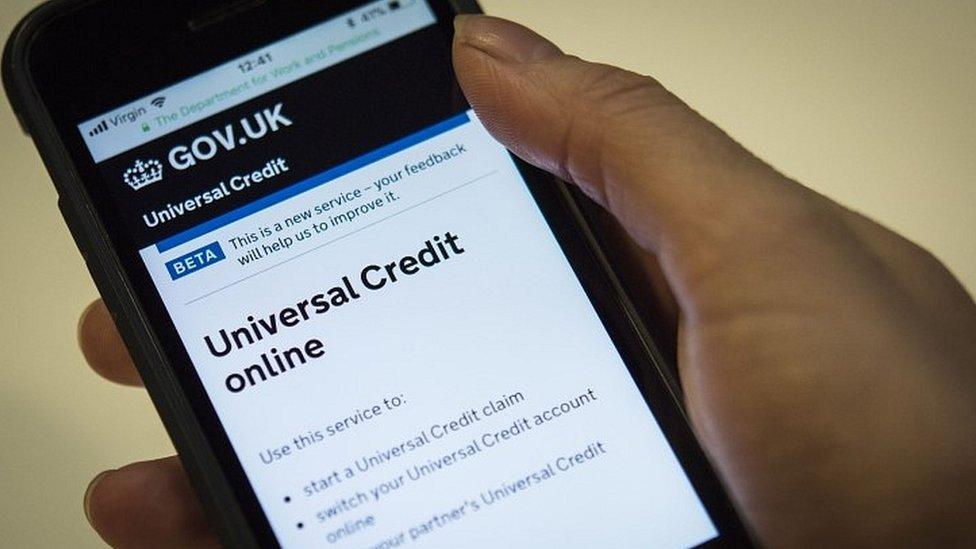Universal credit: Rent arrears double for benefit claimants
- Published
- comments
Universal Credit experience: 'I've been left behind'
Council tenants on universal credit have on average more than double the rent arrears of those still on housing benefit, a BBC investigation has found.
In Flintshire, north Wales, one of the first counties to test the new payment, the council says rent arrears have gone up by £1m.
One claimant there said a mistake left him with just £29 a month to live on.
But the UK government said it had listened to concerns and universal credit was working well.
The BBC contacted every local authority in the UK that has council homes about their arrears. The results from the 129 councils that responded showed the average amount owed by tenants claiming universal credit across the UK is £662.56. For those still on housing benefit it is £262.50
Flintshire council said this week that tenants on universal credit in the county owe on average four times as much rent as those on the old benefits. At times it has been even higher; in September it was six times as much.
In the 18 months since universal credit was introduced in Flintshire, the council's rent arrears have increased by £1m, something officials say is largely due to the new benefit.
Universal credit, external, which had cross-party support when it was first proposed, brings together six benefits, such as job seekers allowance, child tax credits and, crucially, housing benefit, into one payment.
To mirror being paid a salary, it is paid once a month - in arrears.
While this has worked for some, other claimants have said it is this delay in the payment, combined with confusion over the online application process, that has seen families left with no income for weeks, forced to turn to food banks and choose between paying bills or paying their rent.
Universal credit was rolled out to job centres in Flintshire in April 2017, meaning the local authority is ahead of much of the UK. Eighteen months on, 23% of benefit claimants are now on universal credit in Flintshire, compared with about 10% nationally.
Currently one million people across the UK claim the new benefit, a figure that will eventually rise to eight million. Experts and council chiefs are expressing alarm.
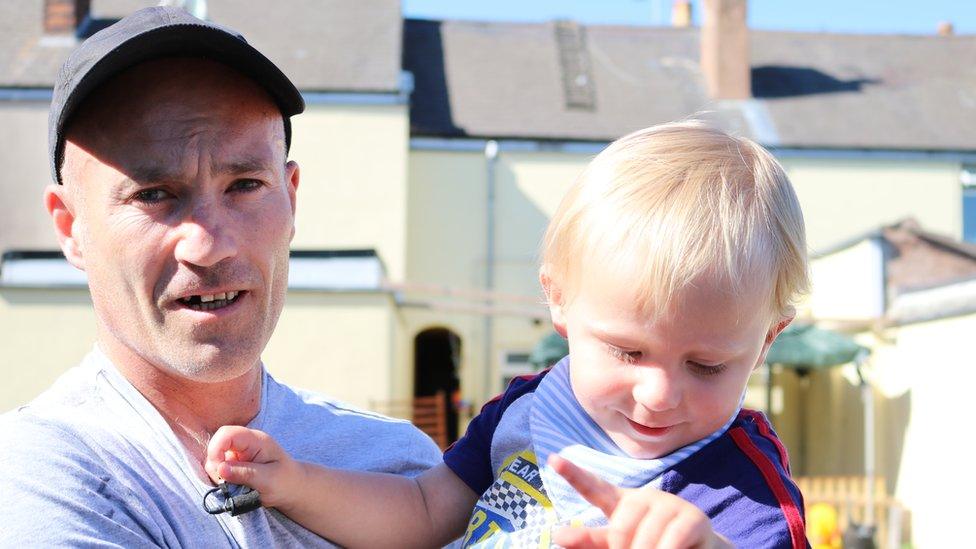
Single dad James McDaid was left with just £30 a month after paying his rent
Saved by the food bank
One person caught up in the universal credit confusion is single dad James McDaid.
He stopped work to look after his two-year-old son, and says he immediately ran into trouble when he made his first claim.
He received £579 a month, out of which he had to pay £550 in rent, and then buy food and pay other bills.
Unable to find out why his payment was so low and forced to turn to the local food bank to have enough to eat, Mr McDaid said he had to wait for months while his claim was processed.
"If there weren't places like this [food bank] you'd be in trouble," he said. "It's quite distressing, you panic about things.
"It's not fair to have that amount of stress. It's just mayhem because you just don't know if you're going to end up on the street or not."
'I've found a bridge to live under'
For fellow universal credit claimant Anthony Smith, the prospect of living on the streets is even closer.
After struggling to cope with the online application process, and being sanctioned for missing meetings, which he accepts made things worse, Mr Smith owed £4,000 in rent when Panorama spoke to him.
"I can quite easily see myself being evicted," said Mr Smith, 63, who has worked all his adult life. "I've even looked for somewhere to live and I've found a bridge where I can live.
"The only thing I'm not playing ball with is I can't use a computer. I'm left behind."
Not long after he was interviewed, Mr Smith was told he would be evicted.
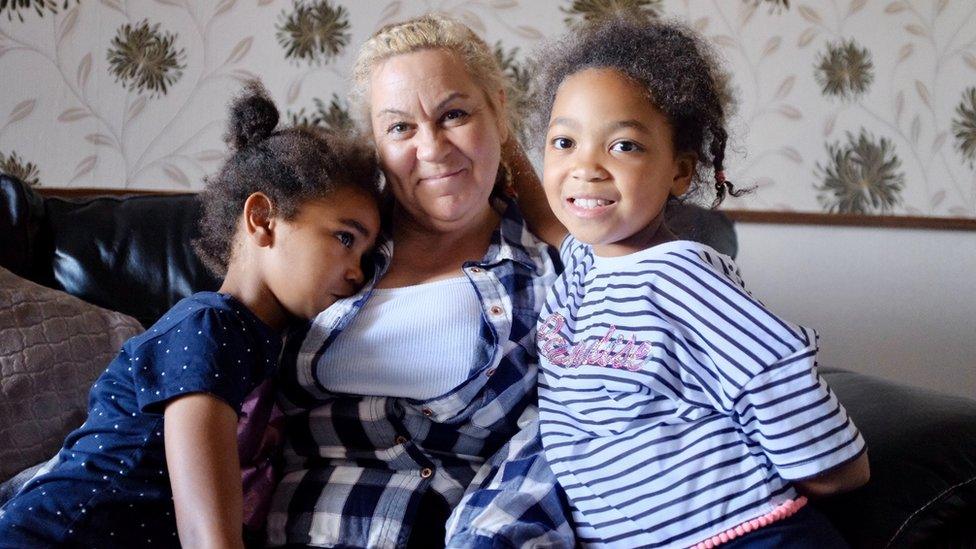
Anita (C) says her family struggled because of Universal Credit
Selling possessions to pay the bills
Partners Anita Igbinoba and Richard Onwuemene had to rely on universal credit when a car accident prevented Mr Onwuemene from working. The couple said because of the way the benefit is calculated monthly, their first payment left them short and struggling with bills.
Ms Igbinoba said: "That [£53] was all we got. We couldn't pay council tax which we owed, we couldn't pay rent. Nobody listened to us, the bills were just going up and up and up. We couldn't get out of it.
"I'd sell things around the house just to make money to put in the electric for that week."
Unable to manage finances
Universal credit is different because the amount for rent is paid straight to claimants, rather than direct to the landlord, like housing benefit.
For those who struggle to keep their finances in order - like Keith Barber who suffers from depression - it can lead to financial trouble.
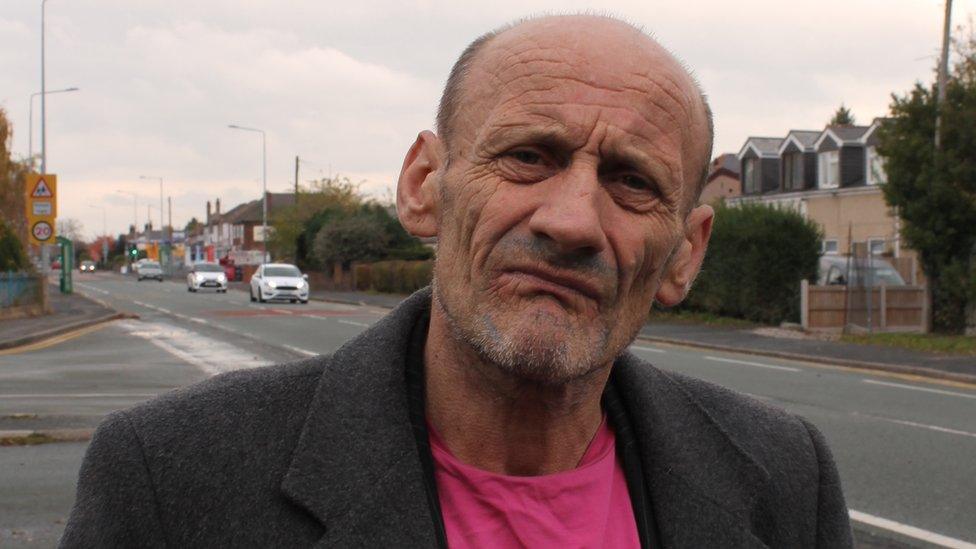
Keith Barber admits he is not good at budgeting
"There's a fair chance the council won't be getting it [the rent]," said Mr Barber, 56, who lives in Deeside.
"I'm just terrible with money - I can't budget at all."
Keith has missed appointments with the Job Centre and his local council. He now owes more than £1,000 in rent and is also facing eviction.
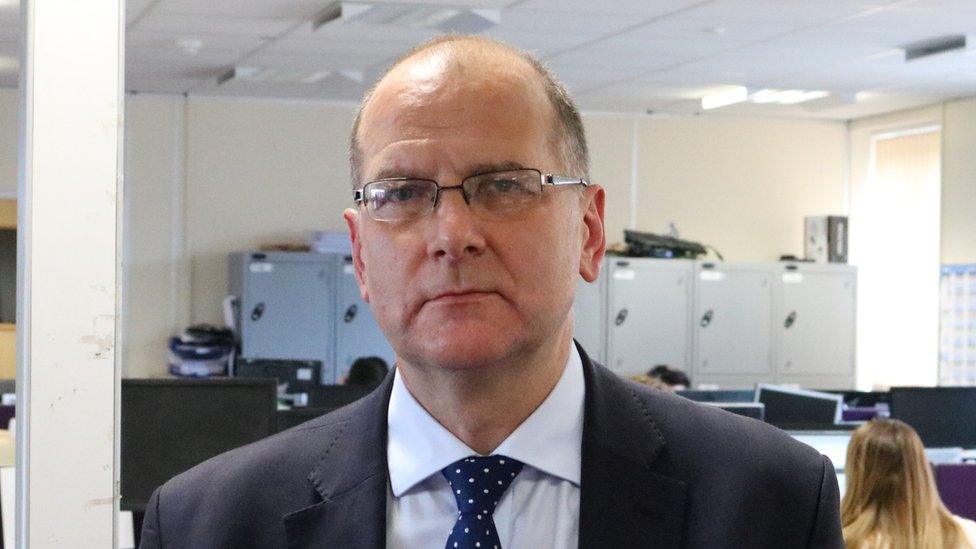
Neal Cockerton said Flintshire council was having to evict tenants who cannot keep up with their rent payments
Evictions
Neal Cockerton, head of housing at Flintshire council, is facing a double problem of tenants who cannot pay their rent and may have to be evicted, and a growing hole in the council's finances.
In 2017 the authority's rent arrears stood at £1.6m. That figure is now more than £2m.
Flintshire council said this week that those on universal credit in the county owe an average of £1,473 as opposed to tenants on the old benefits, who owe £334.
Mr Cockerton and his colleagues now increasingly have to take the difficult decision to evict tenants who cannot keep up with their rent payments. Evictions have increased by 55% compared to the same time last year.
"We do undertake a lot of intensive support before we get to that stage (eviction), but there is a degree of inevitability," he said.
"There's a bit of an ostrich situation that develops - you put your head in the sand and it will go away. It won't go away, the rent has to be paid."
Because universal credit is claimed online, the council has also had to employ four new staff to help with applications and arrears, another cost at a time when budgets are stretched.
The government has given them more funding to offset this, but the council said not only is it not enough, it is stopping in April 2019.
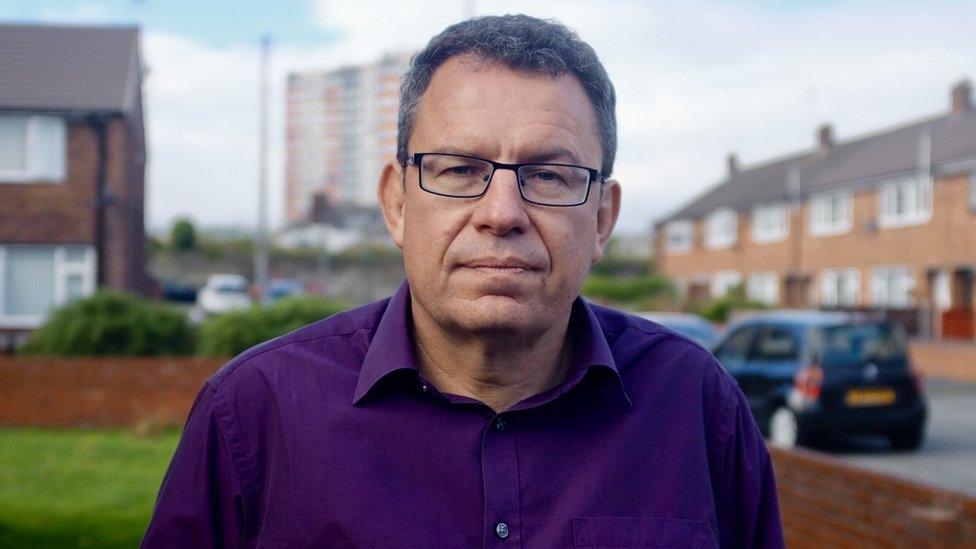
Prof Paul Hickman said universal credit should probably be scrapped
'I would scrap it'
Panorama has also discovered that the government knew rent arrears caused by universal credit could be a problem.
Prof Paul Hickman of Sheffield Hallam University was asked by the UK government to look into the progress of the new benefit.
His study, in 2011, found only 8% of tenants who made seven or more rent payments managed to pay their rent in full.
He said the UK government had these figures but still went ahead with universal credit.
"Were we ignored?" said Prof Hickman. "Some of what we said was listened to but I think they were so committed to the course of rolling out universal credit so in some senses, whatever we found they were going to continue to plough ahead.
"I think realistically given the billions that have been spent in terms of implementing it, it's not going to happen... but I would probably scrap it."
Universal credit 'is working well'
The government has delayed migrating the majority of claimants over to universal credit for another year, as well as announcing more money for improvements to the system. Employment minister Alok Sharma said the new benefit is working, and claimed the rise in rent arrears is only temporary.
He said: "Universal credit is working well. What we have is a system which is simpler, a system which people understand and ultimately makes sure they get into work faster and stay in work longer.
"After a period of time people will on average see those (rent) arrears coming down. But the key point here is to make sure that people get support in terms of funding, and that is why early this year we introduced a package worth one and a half billion pounds which means that anyone who's coming onto universal credit who is currently receiving housing benefit will get an extra two weeks of run-on - two weeks of extra money."
When questioned about direct payments to claimants, the minister said: "We have listened and made sure that it is possible for direct payments to be made to their landlord and that is actually happening across the country."
Watch BBC Panorama's The Universal Credit Crisis on Monday at 19:30. (Wales Investigates, BBC One Wales at 21.30)
- Published7 November 2018

- Published26 October 2018
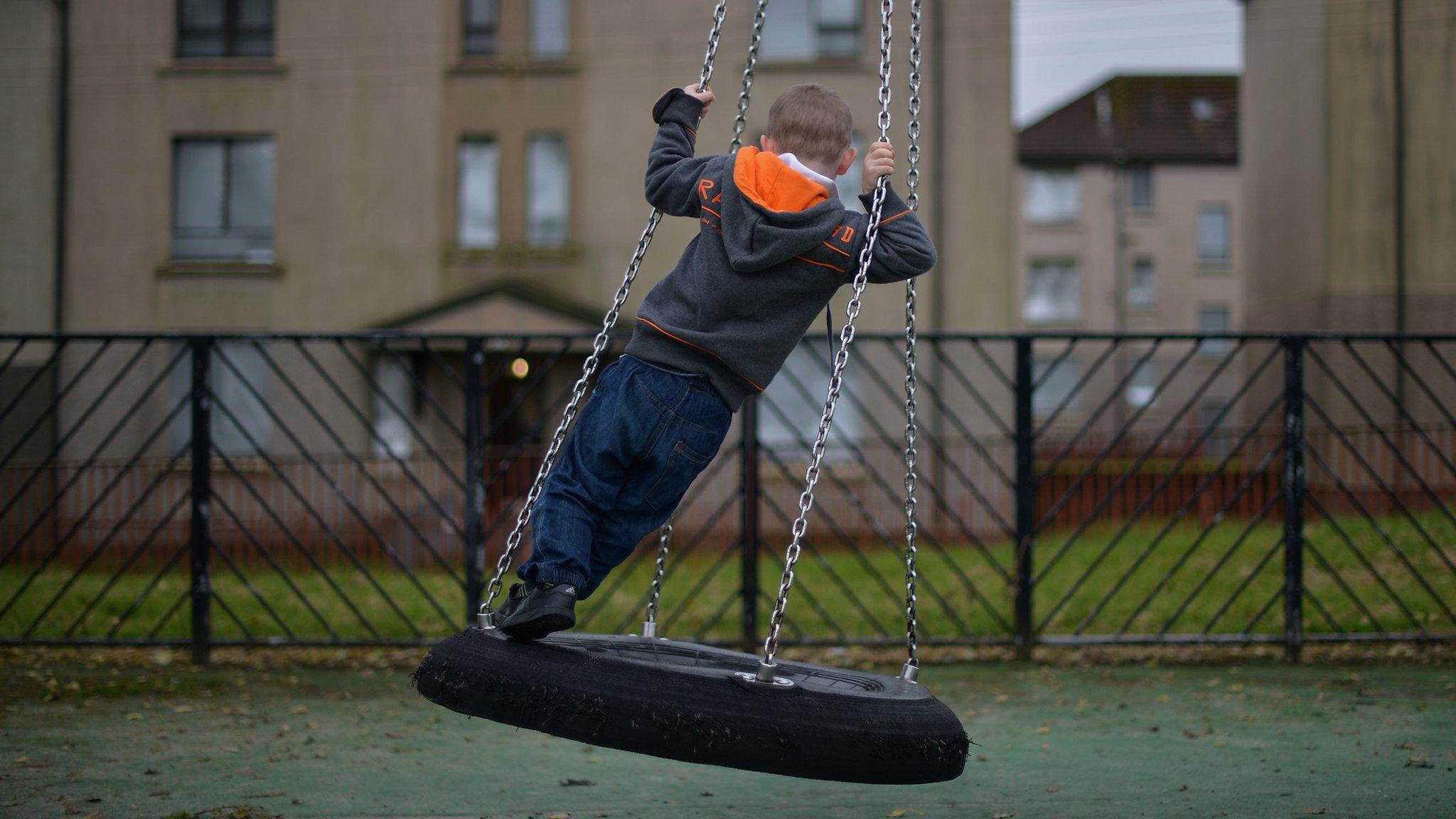
- Published16 October 2018
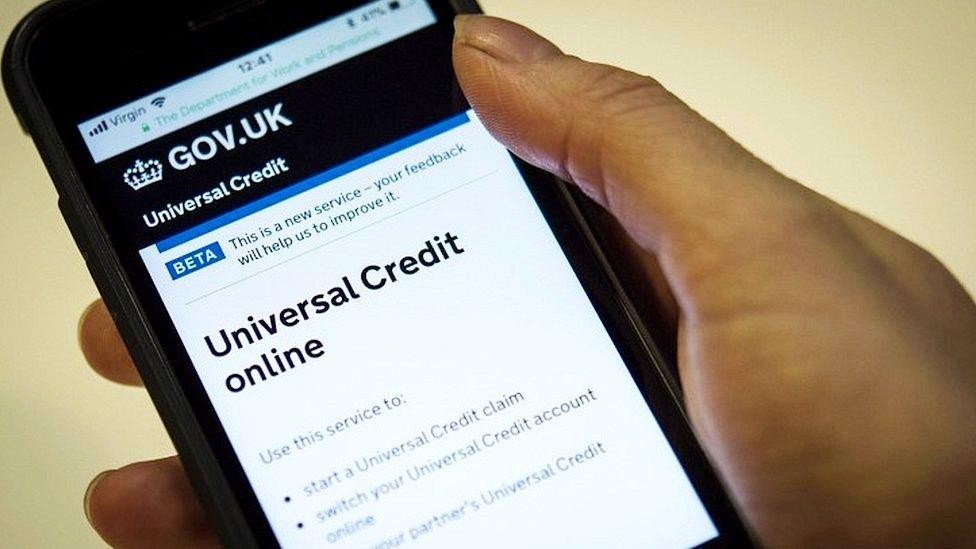
- Published10 October 2018
